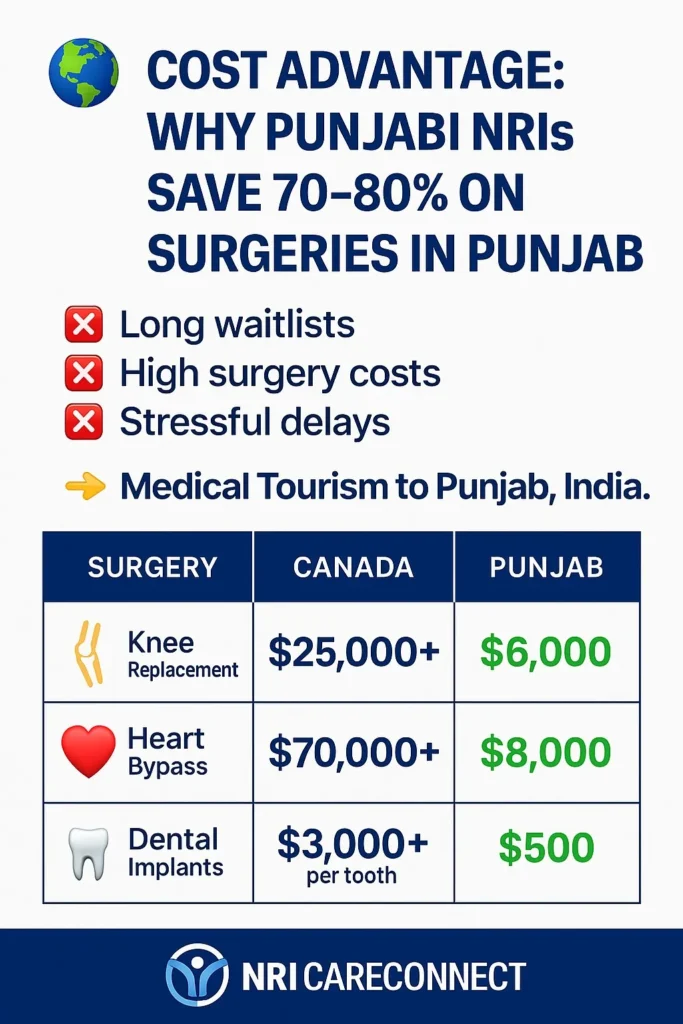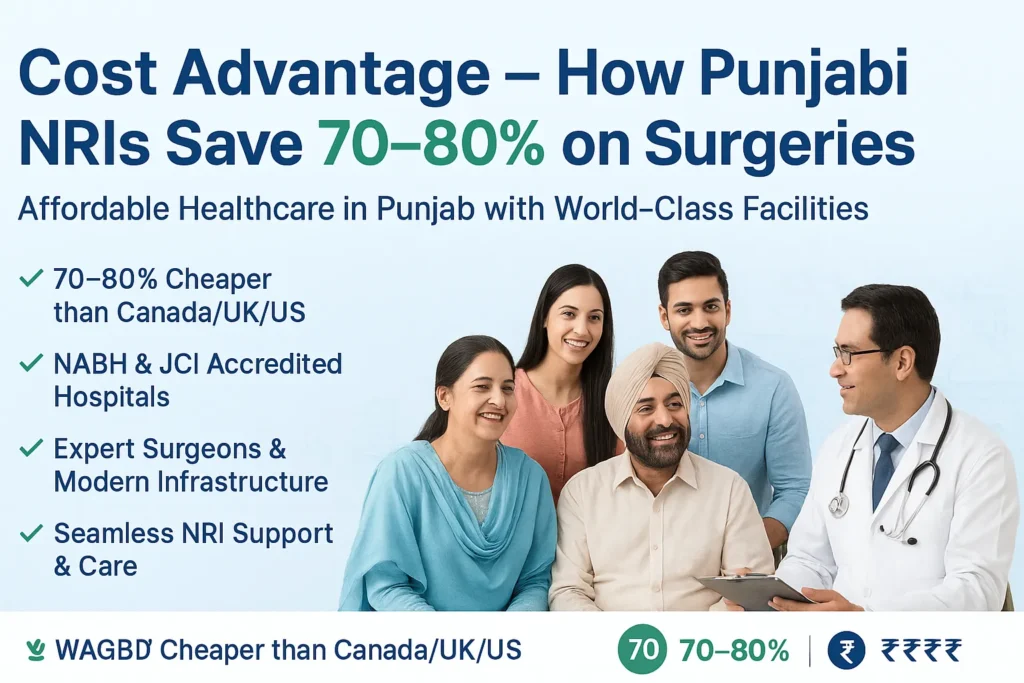


Across Brampton, Surrey, Calgary, Edmonton, and Vancouver, Punjabi NRIs make up one of the most dynamic communities in Canada.
While success in business and family life is often celebrated, one issue continues to cause stress: the rising cost of healthcare. Even though Canada is known for its healthcare system, not every treatment is free or accessible, and many procedures involve long waits or out-of-pocket expenses. This has given rise to a major trend: Punjabi NRIs choosing to return to Punjab for medical treatment. The primary driver? Cost advantage. By opting for surgeries in India, Punjabi NRIs save anywhere from 70–80% compared to what they would spend in Canada.
While some healthcare is covered under the Canadian system, many essential procedures fall into two challenging categories:
– Elective surgeries: These are medically necessary but not life-threatening, such as hip and knee replacements, cataract surgery, and dental implants. They often involve long waiting periods and additional costs.
– Non-covered services: Dental care, cosmetic surgeries, fertility treatments (like IVF), and some advanced diagnostics are often not fully covered by insurance, leaving NRIs with heavy bills.
For example:
– A knee replacement in Canada can cost CAD $25,000–$40,000.
– A heart bypass may go as high as CAD $100,000 if privately arranged.
– Dental implants can cost CAD $3,000–$5,000 per tooth.
– IVF cycles average CAD $15,000–$20,000, with no guarantee of success in one attempt.
For Punjabi families, these costs are overwhelming — particularly when combined with the delays that are so common in the Canadian system.
The cost arbitrage between the Canadian dollar and the Indian rupee is the single biggest factor behind the savings. But it’s not just about the exchange rate — India’s medical ecosystem itself is more cost-efficient.
– CAD $1 = ~₹62–65. This means that every Canadian dollar stretches significantly further in India.
– Hospitals in Punjab operate with lower overheads compared to Canadian facilities. Staffing, equipment maintenance, and hospital administration are more affordable, without compromising quality.
– Hospitals in Punjab often offer fixed-rate packages for common surgeries. These include doctor’s fees, hospital stay, medicines, and follow-ups — making the process transparent and economical.
– With both government and private hospitals competing for NRI patients, the quality is high, but the pricing remains competitive.
Here are a few examples of how much Punjabi NRIs save:
| Procedure | Average Cost in Canada | Average Cost in Punjab (India) | Savings |
|---|---|---|---|
| Knee Replacement | CAD $25,000–$40,000 | CAD $5,000–$7,000 | 75–80% |
| Heart Bypass Surgery | CAD $70,000–$100,000 | CAD $7,000–$10,000 | 85–90% |
| Dental Implants (per tooth) | CAD $3,000–$5,000 | CAD $300–$800 | 80–90% |
| Cataract Surgery (per eye) | CAD $3,000–$5,000 | CAD $500–$800 | 70–80% |
| IVF Treatment (per cycle) | CAD $15,000–$20,000 | CAD $3,000–$5,000 | 70–80% |
These are not minor savings. For many Punjabi families, the difference between paying CAD $30,000 vs. CAD $6,000 is the difference between postponing treatment indefinitely and actually getting it done.

Some NRIs worry that lower cost means lower quality — but that’s not true in Punjab’s leading hospitals.
– World-class facilities: Accredited hospitals in Chandigarh, Mohali, Ludhiana, and Amritsar meet international standards.
– Experienced doctors: Many Punjabi doctors are trained in Canada, the US, or the UK before returning to India.
– Advanced technology: Robotic surgery, laser treatments, and modern cardiac care are available.
– Dedicated NRI services: Hospitals offer English and Punjabi-speaking staff who handle international patients with care and professionalism.
Thus, the cost advantage comes from efficiency, not compromise.
When Punjabi NRIs come to Punjab for medical treatment, they don’t just save on the procedure itself. They also benefit from:
– Shorter recovery stays with family support (instead of costly rehab centers).
– Lower costs of medicine (generic drugs in India are much cheaper).
– Affordable follow-up consultations, which can often be done online once the patient returns to Canada.
This multiplier effect makes Punjab not just affordable, but also emotionally and practically convenient.
In Brampton, Surrey, Edmonton, Calgary, and Vancouver, Punjabi families are openly discussing medical tourism as a serious option. What used to be seen as a “last resort” is now being recognized as the smarter choice:
– Plan an annual visit to Punjab around a surgery or check-up.
– Save money while also visiting extended family.
– Combine healthcare with cultural and emotional reconnection.
It’s not just cost-saving — it’s a holistic experience that strengthens the connection to home.
While cost savings are the big motivator, managing the process can feel overwhelming. This is where NRI Careconnect makes the difference:
– Transparent Planning: We provide clear comparisons of costs in Canada vs. Punjab.
– Hospital Tie-ups: Partnerships with leading hospitals in Punjab ensure quality at competitive prices.
– End-to-End Support: From travel booking to hospital coordination to post-treatment follow-ups.
– Trust Factor: Managed by ex-defence professionals, we bring discipline, integrity, and reliability to every case.
By handling logistics, we ensure Punjabi NRIs not only save money but also have peace of mind.
Understanding the deeper nuances between surgery cost in Punjab vs Canada reveals how these dramatic cost differences unfold more than just price tags. Let’s dive into some detailed aspects that impact the cost structures and patient experience.
One of the most shocking factors is the foreign exchange advantage. At roughly 1 Canadian dollar to 62-65 Indian rupees, a surgery budgeted in Canadian dollars converts into a far bigger spending power in India. But it’s more than currency conversion.
Healthcare in Canada involves much higher labor costs. Nurses, surgeons, technicians, and administrative staff earn substantially higher wages compared to India. Yet, this higher pay is grounded in higher standards of living and operating costs. In Punjab, not only is labor cost much lower, but infrastructure, maintenance, and medical equipment costs are also comparatively affordable, all while maintaining quality.
This advantage allows hospitals in Punjab to offer world-class services at fractions of Canadian prices.
Punjab’s healthcare ecosystem benefits greatly from both government-funded and private hospitals competing for NRI patients. This competitive environment encourages hospitals to keep prices affordable yet also push for higher standards.

Many hospitals offer all-inclusive packages for surgeries tailored for NRIs. These include not just surgery, but pre-surgical tests, hospital stay, medicines, and follow-up consultations. This bundled pricing contrasts with the often fragmented billing process in Canada, where multiple providers and clinics charge separately, adding complexity and cost.
Unlike the relatively impersonal hospital experience that can happen in Canada, especially with long hospital wait times and less family presence, Punjab’s hospitals integrate family involvement into the healing process. Patients typically recover at home or with family support rather than isolated rehab centers.
This emotional comfort itself contributes to quicker recoveries and a better overall experience—something that is priceless but also often overlooked in healthcare cost discussions.
Punjabi NRIs increasingly view medical tourism in Punjab not simply as a workaround for high Canadian healthcare bills but as a smart health and lifestyle choice.
Ludhiana, Mohali, and Chandigarh especially have seen a spike in NRI visitors for medical treatments ranging from dental work to major surgeries. For example, a laparoscopic hysterectomy that could cost upwards of CAD 8,000 in the US, or even more in Canada, is available in Punjab for around CAD 900 (₹70,000).
This trend reflects a broader global movement where medical tourists seek affordable, quality healthcare combined with familial and cultural ties.
Punjab’s reputed hospitals have steadily upgraded technology to rival international standards. Use of advanced robotic surgeries, laser treatments, and even niche cardiac care show how cost savings are achieved through operational efficiency rather than cutting corners.
Doctors trained internationally bring back best practices and help maintain globally competitive care standards. This means Punjabi NRIs enjoy the peace of mind that comes with quality care alongside cost benefits.
Dental implants represent one of the common procedures causing heavy cost burdens in Canada.
– In Canada, a single dental implant can set patients back CAD 3,500 to 5,500.
– In Punjab, the same implant by highly qualified specialists using globally approved materials costs just CAD 300-800.
That’s an up to 80% savings with none of the quality lost.
The difference doesn’t just come from currency but also from lower operational expenses and focused dental tourism sectors that attract NRIs, creating economies of scale.
Fertility treatments like IVF are usually expensive and emotionally taxing worldwide. In Canada, an average cycle can cost CAD 15,000 to 20,000, and often multiple cycles are needed.
In Punjab, a cycle costs roughly CAD 3,000 to 5,000 due to lower medicine and clinical costs, government incentives, and private sector competition. This price difference opens the door for many Punjabi NRIs who want to start families but face financial hurdles in Canada.
Though the savings and quality are standout reasons for choosing Punjab, there’s one more barrier to overcome: logistics.
Travel planning, hospital coordination, follow-up care after surgery, and managing accommodations can feel overwhelming. That’s why services like NRI Careconnect exist: to simplify every step.
From booking flights to hospital stay arrangements, providing bilingual support staff to ensuring timely post-op consultations, they manage everything. This reduces stress and uncertainties for NRIs, allowing them to benefit fully from cost savings and quality care.
Several organizations in Punjab are making medical tourism seamless and reliable for NRIs. Here are some key players:
– Fortis Hospital: Known for its advanced cardiac and orthopedic care, Fortis offers NRI-specific packages with transparent pricing.
– Max Healthcare: Specializing in multi-specialty treatments, Max provides high-quality care with dedicated NRI support desks.
– Apollo Hospital: A leader in robotic surgeries and diagnostics, Apollo ensures world-class standards with affordable costs.
These hospitals work closely with services like NRI Careconnect to streamline the entire process, from consultation to recovery.
The stark contrast between surgery prices in Punjab and Canada is more than just a financial story. It’s a testimony to how smart medical tourism combined with cultural ties builds a bridge back to home for many Punjabi NRIs.
The decision to opt for surgery in Punjab is becoming an informed, economical, and emotionally fulfilling choice — not a last resort. It represents a new era where NRI healthcare is affordable, accessible, and community-driven.
Punjabi NRIs in Brampton, Surrey, Edmonton, Calgary, and Vancouver are embracing this change proudly, improving health outcomes while reconnecting with roots, family, and traditions.
Learn more about medical tourism options at MedicalTourism.com or check out Punjab’s healthcare facilities at Punjab Healthcare.